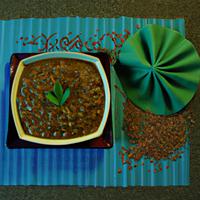
1 serving (100 grams) contains 116 calories, 9.0 grams of protein, 0.4 grams of fat, and 20.0 grams of carbohydrates.

Log this food in SnapCalorie

Nutrition Information
Calories |
232 | ||
|---|---|---|---|
% Daily Value* |
|||
| Total Fat | 0.8 g | 1% | |
| Saturated Fat | 0.2 g | 1% | |
| Polyunsaturated Fat | 0 g | ||
| Cholesterol | 0 mg | 0% | |
| Sodium | 4 mg | 0% | |
| Total Carbohydrates | 40 g | 14% | |
| Dietary Fiber | 15.8 g | 56% | |
| Sugars | 3.6 g | ||
| protein | 18 g | 36% | |
| Vitamin D | 0 mcg | 0% | |
| Calcium | 38 mg | 2% | |
| Iron | 6.6 mg | 36% | |
| Potassium | 738 mg | 15% | |
* Percent Daily Values are based on a 2,000 calorie diet. Your daily values may be higher or lower depending on your calorie needs.
Food Attributes
Source of Calories
About Lentilha
Lentilha, or lentil in English, is a nutrient-dense legume widely used in cuisines across the globe, particularly in South Asian, Middle Eastern, and Mediterranean dishes. Native to the Near East and North Africa, lentils are small, lens-shaped seeds available in various colors, such as green, red, brown, and black. They are an excellent source of plant-based protein, complex carbohydrates, and dietary fiber, making them a staple for vegetarian and vegan diets. Rich in essential nutrients like iron, magnesium, potassium, and B vitamins, lentils support heart health, digestion, and energy production. They are low in fat and naturally gluten-free. While highly nutritious, lentils contain antinutrients like phytic acid that can reduce mineral absorption, though soaking or cooking minimizes their effects. Affordable and versatile, lentils are an ideal ingredient in soups, stews, salads, and side dishes, offering both health benefits and culinary adaptability.



